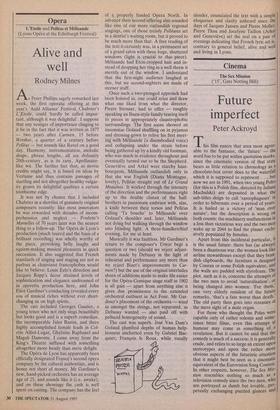Opera
L'Etoile and Pefleas et Melisande (Lyons Opera at the Edinburgh Festival)
Alive and well
Rodney Milnes
As Peter Phillips sagely remarked last week, the first operatic offering at this year's 'Auld Alliance' Festival, Chabrier's L'Etoile, could 'hardly be called impor- tant, although it was delightful'. I suppose that any vestiges of importance clinging to it lie in the fact that it was written in 1877 — two years after Carmen, 15 before Werther, a quarter of a century before Pefleas — but sounds like Ravel on a good day. Harmony, instrumentation, melodic shape, phrase lengths, all are defiantly 20th-century, as is its zany, Apollinaire- like wit. The further fact that, as movie credits might say, it is based on ideas by Verlaine and thus contains passages of startling and not altogether healthy vulgar- ity grants its delightful qualities a certain toothsome edge.
It was not by chance that I included Chabrier in a shortlist of genuinely original composers recently: like most innovators he was rewarded with decades of incom- prehension and neglect --L- Poulenc's Mamelles of 70 years later was the nearest thing to a follow-up. The Opera de Lyon's production (much toured and the basis of a brilliant recording) was wholly worthy of the piece, provoking belly laughs and squirm-making musical pleasures in quick succession. It also suggested that French standards of singing and staging are not as parlous as chauvinist francophobes would like to believe: Louis Erlo's direction and Jacques Rapp's decor attained levels of sophistication and elegance undreamed of in operetta production here, and John Eliot Gardiner's conducting revealed every sou of musical riches without ever short- changing us on high spirits.
The cast included Georges Gautier, a young tenor who not only sings beautifully but looks good and is a superb comedian, the incomparable Jules Bastin, and three highly accomplished female leads in Col- ette Alliot-Lugaz, Ghylaine Raphanel and Magali Damonte. I came away from the King's Theatre suffused with something altogether more heady than mere delight.
The Opera de Lyon has apparently been officially designated France's second opera company by the cultural authorities, and is hence not short of money. Mr Gardiner's new, hand-picked orchestra has an average age of 25, and sounds like it (i.e. awake), and on these showings the cash is well spent on casting. The company has the feel of a properly funded Opera North. In advance their second offering also sounded like one of our more outlandish regional stagings, one of those trendy Pelleases set in a dentist's waiting room, but it proved to be much more than that. A free reading of the text it certainly was, in a permanent set of a grand salon with three huge, shuttered windows (light is crucial to this piece). Melisande had Eton-cropped hair and in- stead of dropping her ring in a well threw it merrily out of the window. I understand that the first-night audience laughed at this, but we second-nighters are made of sterner stuff.
Once such a two-pronged approach had been hoisted in, one could relax and draw what one liked from what the director, Pierre Strosser, had to offer — roughly speaking an Ibsen-style family tearing itself to pieces in appropriately claustrophobic surroundings. The first scene showed an insomniac Golaud shuffling on in pyjamas and dressing-gown to relive his first meet- ing with Melisande (a disembodied voice) and collapsing under the strain before being gathered up by a kindly old footman, who was much in evidence throughout and eventually turned out to be the Shepherd. Genevieve and Arkel were starchy haut- bourgeois, Melisande outlandish only in that she was English (Diana Montague, lovely), PeIleas straight out of Le Grand Meaulnes. It worked through the intensity of the direction and the performances right up to the double climax of the half- brothers in passionate embrace with, alas, a knife between their torsos and PeIleas calling `Ta bouche' to Melisande over Golaud's shoulder and, later, Melisande not dying but walking through the window into blinding light. A three-handkerchief evening, for me at least.
Musically it was faultless. Mr Gardiner's return to the composer's Urtext begs a question or two (should we reject adjust- ments made by Debussy in the light of rehearsal and performance any more than we reject Bizet's improvements to Car- men?) but the use of the original interludes shorn of additions made to make life easier for the Opera-Comique stage staff in 1902 is all gain — apart from anything else it gives due prominence to the extended orchestral outburst in Act Four. Mr Gar- diner's placement of the orchestra — wind in amongst the strings, not separated, as Debussy wanted — also paid off with pellucid homogeneity of sound.
The cast was superb. Jose Van Dam's Golaud plumbed depths of human help- lessness uncharted even by Gabriel Bac- quier; Francois le Roux, while vocally slender, enunciated the text with a simple eloquence and clarity unheard since the days of Jacques Jansen and Pierre Mollet; Pierre Thau and Jocelyne Taillon (Arkel and Genevieve) set the seal on a pair of evenings indicating that French lyric art is, contrary to general belief, alive and well and living in Lyons.










































 Previous page
Previous page